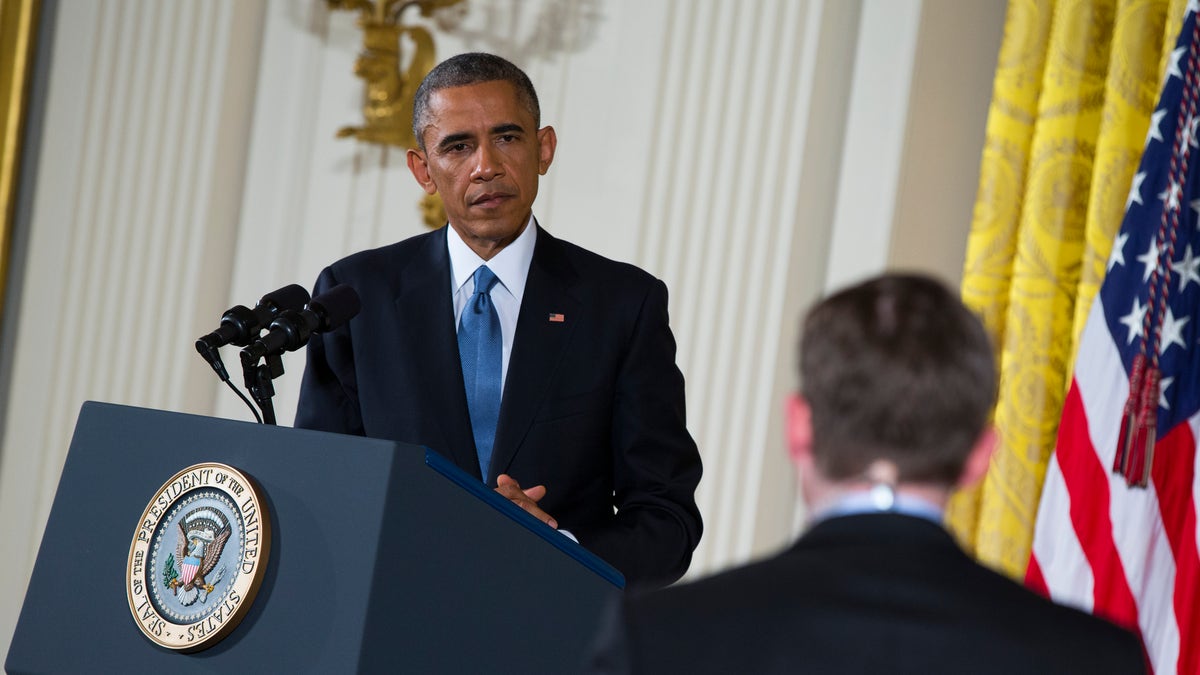
President Obama in the East Room of the White House, on Wednesday, Nov. 5, 2014, in Washington. (ap)
Any day now, President Obama will announce his executive action on immigration, and conservative lawmakers are not happy. "This is the wrong way to govern,” said House Speaker John Boehner (R-Ohio). Senators John McCain (R-Ariz.) and Marco Rubio (R-Fla.) sent a letter to the White House warning the president against taking executive action, and questioning his authority to do so.
Like it or not, the president has authority to act alone on immigration. Not only has the Supreme Court recognized the president’s discretion over immigration matters, presidents have been taking unilateral action on immigration for decades.
Some people are uncomfortable with Obama going solo on such a contentious issue. Still, no matter what he does, his executive orders will be subject to cancellation by the next president.
Under Article 2, Section 3 of the Constitution, the president is required to “take care that the Laws be faithfully executed.” Broadly speaking, President Obama has fulfilled this responsibility. He is responsible for record levels of deportations, and his administration spent $18 billion on immigration enforcement in 2012. Every night, there are roughly 34,000 undocumented immigrants in detention. So it is a stretch to charge that Obama is not “faithfully executing” immigration laws.
Yet just as the president has the duty to enforce immigration laws, he has the power to set immigration enforcement priorities. Under the doctrine of “prosecutorial discretion,” he can decide who will be a priority for deportation. In fact, the president has to set enforcement priorities for the Department of Homeland Security, because Congress only allots money to deport about 400,000 people a year – and there are an estimated 11 million undocumented people within our borders.
There are only two constitutional limits on the executive branch’s discretion on immigration. The president cannot decide to enforce immigration law based on an individual’s race, religion, or other impermissible factors, and the president cannot completely abdicate responsibility for immigration enforcement. President Obama is not proposing either of these prohibited moves.
With his executive action, President Obama will likely defer deportations for certain immigrants, and here he stands on solid legal footing. Consider that in September, a group of 136 law professors and legal experts sent a letter to the White House stating that the president has authority to expand deportation relief for undocumented immigrants. They noted that prosecutorial discretion is “a common, long-accepted legal practice in practically every law enforcement context,” and that its application is “grounded in the Constitution.” In addition, they pointed out that the size of any potential class of beneficiaries of executive action was irrelevant to its legality.
The Supreme Court has recognized the president’s discretion over immigration law as well. In U.S. v. Arizona (2012), the high court ruled that Arizona’s SB 1070 law not only interfered with the federal government authority to act on immigration, it also interfered with the federal government’s authority not to act on immigration. As Fox News host Megyn Kelly once explained to Sen. Jeff Sessions (R-Ala.) on air, "the president does have prosecutorial discretion when it comes to immigration, the Supreme Court made that clear as recently as 2012."
Legalities aside, executive action on immigration is nothing new. In October, the nonpartisan American Immigration Council released a report showing that presidents have taken executive action on immigration 39 times in the last 60 years – going at least as far back as President Eisenhower in 1956. Former Republican presidents Nixon, Reagan, George H.W. Bush, and George W. Bush all took unilateral action on immigration. It was legal when they did it, and it will be legal when President Obama does it too. Actually, President Obama has already taken executive action on immigration; his 2009 decision to expand the Secure Communities program and his decision last summer to expedite the removals of child migrants were both unilateral immigration moves.
Some people are uncomfortable with Obama going solo on such a contentious issue. Still, no matter what he does, his executive orders will be subject to cancellation by the next president. He doesn’t have the power to give anyone a green card or citizenship. And he’s even offered to tear up his executive orders if Congress sends him a comprehensive immigration bill. The president is simply acting to move away from paralysis on immigration, and towards progress.
President Obama’s executive orders on immigration will not violate the Constitution. Although his actions will no doubt be controversial, they will nonetheless be legally sound.
